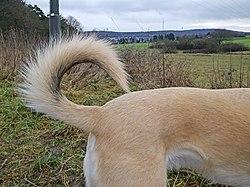бӧж
Hello, you have come here looking for the meaning of the word бӧж. In DICTIOUS you will not only get to know all the dictionary meanings for the word бӧж, but we will also tell you about its etymology, its characteristics and you will know how to say бӧж in singular and plural. Everything you need to know about the word бӧж you have here. The definition of the word бӧж will help you to be more precise and correct when speaking or writing your texts. Knowing the definition ofбӧж, as well as those of other words, enriches your vocabulary and provides you with more and better linguistic resources.

Пон бӧж.
See also: бож
Komi-Zyrian

Etymology
From Proto-Permic *bȯž, from Proto-Uralic *ponče. Cognates include Eastern Mari поч (poč) and Eastern Khanty (poč, “heel”).
Pronunciation
Noun
бӧж • (böž)
Declension
| singular | plural | ||
|---|---|---|---|
| nominative | бӧж (böž) | бӧжъяс (böžjas) | |
| accusative | I 1 | бӧж (böž) | бӧжъяс (böžjas) |
| II 1 | бӧжӧс (böžös) | бӧжъясӧс (böžjasös) | |
| instrumental | бӧжӧн (böžön) | бӧжъясӧн (böžjasön) | |
| comitative | бӧжкӧд (böžköd) | бӧжъяскӧд (böžjasköd) | |
| caritive | бӧжтӧг (böžtög) | бӧжъястӧг (böžjastög) | |
| consecutive | бӧжла (böžla) | бӧжъясла (böžjasla) | |
| genitive | бӧжлӧн (böžlön) | бӧжъяслӧн (böžjaslön) | |
| ablative | бӧжлысь (böžlyś) | бӧжъяслысь (böžjaslyś) | |
| dative | бӧжлы (böžly) | бӧжъяслы (böžjasly) | |
| inessive | бӧжын (böžyn) | бӧжъясын (böžjasyn) | |
| elative | бӧжысь (böžyś) | бӧжъясысь (böžjasyś) | |
| illative | бӧжӧ (böžö) | бӧжъясӧ (böžjasö) | |
| egressive | бӧжсянь (böžśań) | бӧжъяссянь (böžjasśań) | |
| approximative | бӧжлань (böžlań) | бӧжъяслань (böžjaslań) | |
| terminative | бӧжӧдз (böžödź) | бӧжъясӧдз (böžjasödź) | |
| prolative | I | бӧжӧд (böžöd) | бӧжъясӧд (böžjasöd) |
| II | бӧжті (böžti) | бӧжъясті (böžjasti) | |
1 Animate nouns almost exclusively take the type II accusative ending, whereas inanimate nouns can be used with either ending, but are more often found with type I.
1 Animate nouns almost exclusively take the type II accusative ending, whereas inanimate nouns can be used with either ending, but are more often found with type I.
1 Animate nouns almost exclusively take the type II accusative ending, whereas inanimate nouns can be used with either ending, but are more often found with type I.
1 Animate nouns almost exclusively take the type II accusative ending, whereas inanimate nouns can be used with either ending, but are more often found with type I.
1 Animate nouns almost exclusively take the type II accusative ending, whereas inanimate nouns can be used with either ending, but are more often found with type I.
1 Animate nouns almost exclusively take the type II accusative ending, whereas inanimate nouns can be used with either ending, but are more often found with type I.
1 Animate nouns almost exclusively take the type II accusative ending, whereas inanimate nouns can be used with either ending, but are more often found with type I.
| ||||||||||||||||||||||||||||||||||||||||||||||||||||||||||||||||||||||||||||||||||||||||||||||||||||||||||||||||||||||||||||||||||||||||||||||||||||||||||||||||||||||||||||||||||||||||||||||||||||||||||||||||||||||||||||||||||||||||||||||||||||||||||||||||||||||||||||||||||||||||||||||||||||||||||||||||||||||||||||||||||||||||||||||||||||||||||||||||||||||||||||||||||||||||||||||||||||||||||||||||||||||||||||||||||||||||||||||||||||||||||||
Derived terms
References
- A. I. Podorova, editor (1948), Коми-русский словарь , Syktyvkar: Коми Государственное Издательство, page 27
- L. M. Beznosikova, E. A. Ajbabina, R. I. Kosnyreva (2000) Коми-русский словарь , →ISBN, page 51